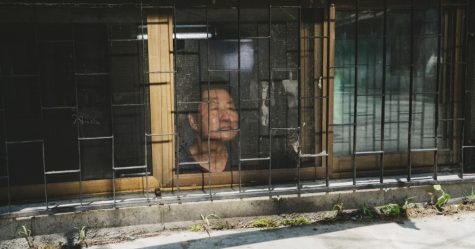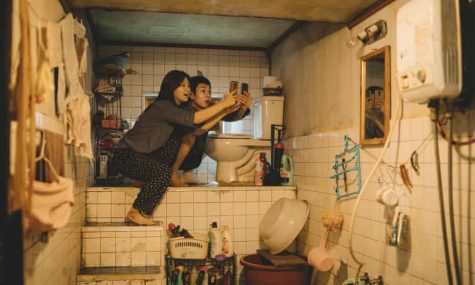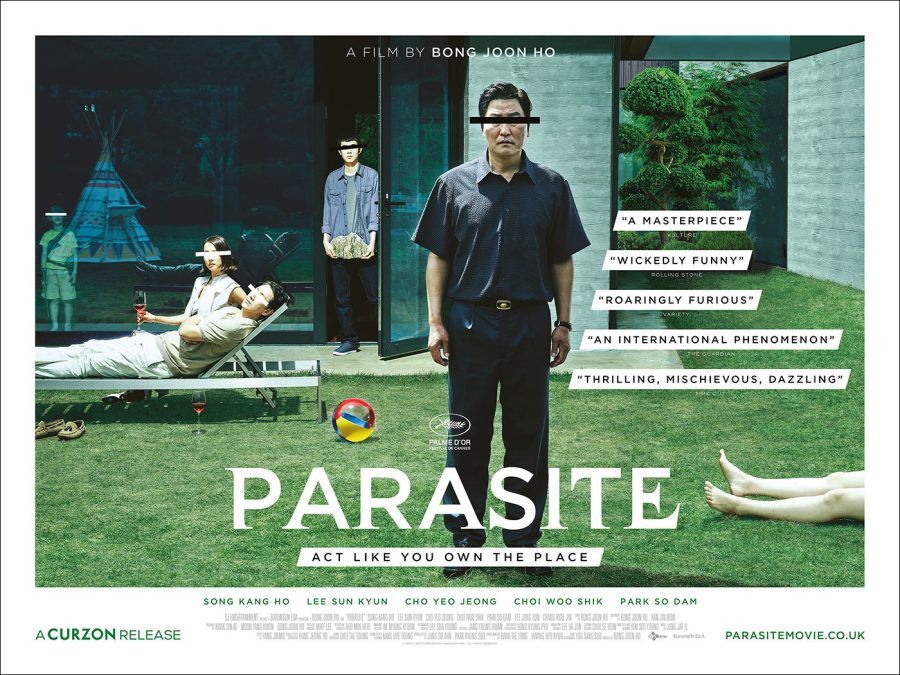Film Review: Parasite- a Chilling Take on the Cruelties of Inequality
September 30, 2021
It would be quite a cliche to call a movie that won six Oscars simply “good” or “outstanding” because the same could be said for a lot of award-winning films. Yet, I find that Parasite, directed by Bong Joon-ho, is far more extraordinary, deep, and brilliantly metaphoric than I see in most other films. I would argue this movie is one of the best stories to have ever been written, and similarly reflected onto the big screen, but you’ll just have to watch and see for yourself 😉

Parasite tackles the struggles of systemic inequality through wealth that plagues all four corners of the world through the eyes of the Kim family. There is often the question of whether the poor can really make it in the world of the rich, or if they can somehow manipulate their situation to end up on the top. Likewise, all of these themes are explored throughout the film. Uneducated, poor, and subjected to a life of poverty, the Kim family is looking to branch their way up the socio-economic ladder by essentially “leeching” off a wealthy family they come into contact with. The start of the film gives us insight into just how precarious their situation is: the family fold pizza boxes for a company as a living, the only wifi they get comes from a coffee shop nearby, they live in a house underneath the ground that is consistently trashed by passerbyers, and the family deliberately leaves their windows open as the streets are fumigated as a way to handle the termites in their home. Though it is a sad scene, the Kim family makes sure everything they do revolves around a plan: to escape poverty.
The plan first starts with the son, Kim Ki-Woo, who fakes his college degree and takes on the job as a tutor in a wealthy family. Seeing a chance to reach upward mobility, the entire family jumps on this chance to make it big by slowly integrating themselves into this home. The sister takes on the role of an art therapy teacher for the youngest child, the father replaces the disgraced driver. the mother worms her way in as the new housekeeper after undermining the old one. Things seem to be going great for the rich Park family, and the newly adjusted Kim family who find the ranks of the highest life to be much more tolerable. In this sense, Bong Joon-ho makes the family symbolic parasites, sucking off the success of this rich family, but the real question resides in this: Who is the real parasite? Can we look to the wealthy as visions of success when they have reached the top by just as unethical means? Can fate be changed? Who knows.

The great thing about this script is that it constantly keeps you on your toes with persistent plot twists and turns that have you reevaluating your opinions on destiny and manipulation. Unlike most other films, this movie is not afraid to cross the line into territory that may often be unspoken about, such as the exploitation of the lower class. The film is entertaining in its ability to make you change your outlook on the entire class system as you come to realize the rich need the poor to survive as much as they may think they need them.
The discussion around the film can be controversial because it questions aspects of society if no one is willing to give an answer too. Still, it has the innate ability to be both disturbing and joyous simultaneously as the plot of these manipulating families plus interlopers plays out. I believe this movie is unable to unpack a lot about society with its relatable dynamics, change of fates, and questions against morality that many seldom think about. If you truly want to get a better understanding of the cruelties that extend from gross inequality, and how fate (good and bad) has the potential to be changed, I would HIGHLY recommend this film. No real parasites in the form of bugs or viruses need to be present in this film as humans take on that role themselves.



